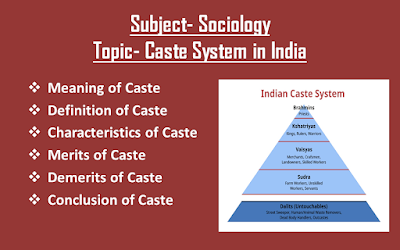Society- Meaning, Definition, Characteristics and Types
# Meaning of Society
The term society is derived from Latin word ‘socius’ which means ‘companionship’ or ‘association’ or ‘togetherness’. Thus, society refers to a group of people living together with shared cultures, having social interactions and inter-relationships.
In sociology, the term society refers not just to a group of people but to the complete pattern of the norms of interaction that arise among them. It is a process rather than a thing, motion rather than structure.
A layman often defines society as an aggregation or collection of individuals.
The important aspect of society is the system of relationships, the patterns of norms of interaction by which the members of society maintain themselves.
# Definition of Society
1. According to G.D.H. Cole:- “Society is the complex of organized associations and institutions within the community.”
2. According to Richard LaPiere:- “Society refers not just to a group of people, but to the complex pattern of norms of interaction that arises among and between them.”
3. According to Harkins:- “Society refers to a permanent or continuing group of men, women, and children, able to carry the process of racial perpetuation and maintenance on their own cultural levels independently.”
4. According to MacIver:- "Society is a web of social relationship.”
5. According to Green:- “A society is the larger group to which any individual belongs."
6. According to Ginsberg:- “A society is a collection of individuals united by certain relations or, modes of behaviour which mark them off from others who do not enter into these relations or who differ from them in behaviour.”
7. According to Giddings:- “Society is the union itself, the organization, the sum of formal relations in which associating individuals are bound together.”
# Characteristics of Society
1. It consists
of people:- It is composed of people. Without people, there is no
society. No social relationships and no social life are possible.
2. It is not
only a group of persons:- Society is not just a collection of individuals,
but rather a complex network of relationships and interactions among and between
people and groups.
3. It is based
upon interdependence:- Social relationships are marked by interdependence,
meaning that individuals and groups in society rely on each other for the
fulfillment of their needs and goals. No one is entirely self-sufficient, and
people need each other to achieve mutual benefits and satisfaction.
4. Mutual
interaction and awareness:- A society consists of a group of people who engage
in continuous interaction with one another, made possible by their mutual
awareness of each other's existence, needs, and intentions. Indeed, social
interaction and awareness are essential prerequisites for the existence of a
society, and without them, society as we know it would cease to exist.
5. Cooperation
and conflict:- Society is founded on cooperation, which is the
cornerstone of our social existence. Through cooperation, individuals can
fulfill their needs and desires, achieving mutual benefits and advancement.
However, due to the diversity of interests, values, and beliefs, conflicts
inevitably arise, either overtly or covertly, alongside cooperation, making
conflict resolution and management an essential aspect of social dynamics.
6. Permanent
nature:- It is not a temporary organization of individuals. Society
continues to exit even after the death of individual members. Society is coherent
organization.
7. Comprehensive
culture:- Every society has a unique culture that sets it apart from
others, and this culture is comprehensive and self-sufficient, providing all
the necessary elements for social life to function. Moreover, each society
passes on its cultural heritage to the next generations, ensuring continuity
and preservation of its cultural identity, values, beliefs, and practices.
8. Society is abstract:- Society is abstract in nature, invisible to the eye, but palpable in its effects. It is comprised of social relationships, social interactions, human behavior, customs, rituals, and other intangible elements that shape our collective experience.
9. Society is dynamic:- Society is dynamic and constantly evolving, with change being an inherent and ongoing process. New relationships, interactions, institutions, and groups emerge, while others fade away, leading to gradual or sudden transformations that reshape the social landscape.
10. It is a complex system:- As individuals' roles, rights, duties, and circumstances continually shift, the entire social structure is transformed. The dynamic nature of society leads to increasing complexity, evolving from simpler forms to more intricate and sophisticated systems, adapting to the changing needs and interactions of its members.
# Types of Society
There are
three types of society: Early, developing and advanced throughout the world.
1. Early societies:- Early societies are hunter-gatherer societies and pastoral societies. These societies did not have firm ties to specific geographical areas and they were mostly concerned with providing for their immediate and extended families.
2. Developing societies:- Developing societies include horticultural or agricultural societies in which individuals grew or maintained crops to provide food and other resources for larger groups of people than their families.
3. Advanced societies:- Advanced societies are industrial and postindustrial societies in which technology and manufacturing for large groups of people are the most important aspects regarding economics.
Watch video on YouTube





